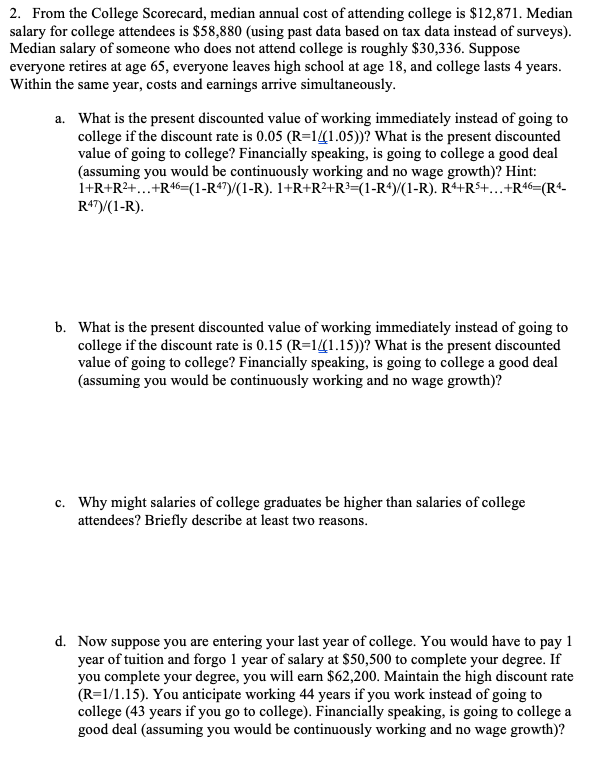2. From the College Scorecard, median annual cost of attending college is $12,871. Median salary for college attendees is $58,880 (using past data based on tax data instead of surveys). Median salary of someone who does not attend college is roughly $30,336. Suppose everyone retires at age 65, everyone leaves high school at age 18, and college lasts 4 years. Within the same year, costs and earnings arrive simultaneously. a. What is the present discounted value of working immediately instead of going to college if the discount rate is 0.05 (R=1(1.05))? What is the present discounted value of going to college? Financially speaking, is going to college a good deal (assuming you would be continuously working and no wage growth)? Hint: 1+R+R²+..+R46=(1-R47)/(1-R). 1+R+R²+R³=(1-R*)/(1-R). Rª+R$+...+R46=(R4- R47)/(1-R).
2. From the College Scorecard, median annual cost of attending college is $12,871. Median salary for college attendees is $58,880 (using past data based on tax data instead of surveys). Median salary of someone who does not attend college is roughly $30,336. Suppose everyone retires at age 65, everyone leaves high school at age 18, and college lasts 4 years. Within the same year, costs and earnings arrive simultaneously. a. What is the present discounted value of working immediately instead of going to college if the discount rate is 0.05 (R=1(1.05))? What is the present discounted value of going to college? Financially speaking, is going to college a good deal (assuming you would be continuously working and no wage growth)? Hint: 1+R+R²+..+R46=(1-R47)/(1-R). 1+R+R²+R³=(1-R*)/(1-R). Rª+R$+...+R46=(R4- R47)/(1-R).
Chapter11: Labor Markets
Section: Chapter Questions
Problem 3SQP
Related questions
Question
100%
2a
2b

Transcribed Image Text:2. From the College Scorecard, median annual cost of attending college is $12,871. Median
salary for college attendees is $58,880 (using past data based on tax data instead of surveys).
Median salary of someone who does not attend college is roughly $30,336. Suppose
everyone retires at age 65, everyone leaves high school at age 18, and college lasts 4 years.
Within the same year, costs and earnings arrive simultaneously.
a. What is the present discounted value of working immediately instead of going to
college if the discount rate is 0.05 (R=11.05))? What is the present discounted
value of going to college? Financially speaking, is going to college a good deal
(assuming you would be continuously working and no wage growth)? Hint:
1+R+R2+...+R46=(1-R47)/(1-R). 1+R+R2+R³=(1-R*)/(1-R). Rª+R$+...+R46=(R4-
R47)/(1-R).
b. What is the present discounted value of working immediately instead of going to
college if the discount rate is 0.15 (R=1(1.15))? What is the present discounted
value of going to college? Financially speaking, is going to college a good deal
(assuming you would be continuously working and no wage growth)?
c. Why might salaries of college graduates be higher than salaries of college
attendees? Briefly describe at least two reasons.
d. Now suppose you are entering your last year of college. You would have to pay 1
year of tuition and forgo 1 year of salary at $50,500 to complete your degree. If
you complete your degree, you will earn $62,200. Maintain the high discount rate
(R=1/1.15). You anticipate working 44 years if you work instead of going to
college (43 years if you go to college). Financially speaking, is going to college a
good deal (assuming you would be continuously working and no wage growth)?
Expert Solution
This question has been solved!
Explore an expertly crafted, step-by-step solution for a thorough understanding of key concepts.
This is a popular solution!
Trending now
This is a popular solution!
Step by step
Solved in 3 steps

Knowledge Booster
Learn more about
Need a deep-dive on the concept behind this application? Look no further. Learn more about this topic, economics and related others by exploring similar questions and additional content below.Recommended textbooks for you



Microeconomics: Private and Public Choice (MindTa…
Economics
ISBN:
9781305506893
Author:
James D. Gwartney, Richard L. Stroup, Russell S. Sobel, David A. Macpherson
Publisher:
Cengage Learning



Microeconomics: Private and Public Choice (MindTa…
Economics
ISBN:
9781305506893
Author:
James D. Gwartney, Richard L. Stroup, Russell S. Sobel, David A. Macpherson
Publisher:
Cengage Learning

Economics: Private and Public Choice (MindTap Cou…
Economics
ISBN:
9781305506725
Author:
James D. Gwartney, Richard L. Stroup, Russell S. Sobel, David A. Macpherson
Publisher:
Cengage Learning
